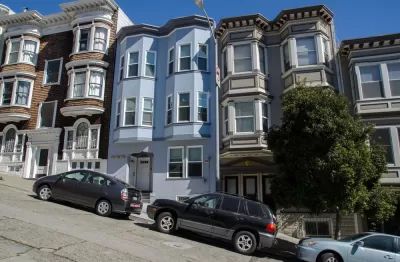Analysis and policy recommendations from Bay Area-based think tank SPUR focuses on how poorly designed inclusionary zoning the exact opposite of the desired effect.

"San Francisco is running out of funds to build affordable housing, and the city will need to make changes quickly to fix the problem," according to an article by Adhi Nagraj.
One question that must be asked in response to this reality: How did a city riding an economic boom get so short on funding to solve one of its most visible and morally troubling challenges? And another question: What can the city do about it?
To explain how the city got to this point, Nagraj has this to say: "Many factors are at play, but a look at data from the city indicates that a combination of rising construction costs and new requirements is slowing down new development and curtailing incoming funds from development fees.
And as for what to do about it, Nagraj shares five immediate suggestions endorsed by SPUR, including:
- Audit the building code to reduce costs.
- Support pre-fab construction outside of San Francisco.
- Set new inclusionary requirements.
- Allow more density bonuses.
- Pause increased inclusionary requirements.
The article includes a lot more detail on the how of San Francisco's funding shortage, as well as more detail on each of the five recommendations for what to do about it.
FULL STORY: How Has San Francisco Run Out of Money for Affordable Housing?

Alabama: Trump Terminates Settlements for Black Communities Harmed By Raw Sewage
Trump deemed the landmark civil rights agreement “illegal DEI and environmental justice policy.”

Planetizen Federal Action Tracker
A weekly monitor of how Trump’s orders and actions are impacting planners and planning in America.

Why Should We Subsidize Public Transportation?
Many public transit agencies face financial stress due to rising costs, declining fare revenue, and declining subsidies. Transit advocates must provide a strong business case for increasing public transit funding.

Understanding Road Diets
An explainer from Momentum highlights the advantages of reducing vehicle lanes in favor of more bike, transit, and pedestrian infrastructure.

New California Law Regulates Warehouse Pollution
A new law tightens building and emissions regulations for large distribution warehouses to mitigate air pollution and traffic in surrounding communities.

Phoenix Announces Opening Date for Light Rail Extension
The South Central extension will connect South Phoenix to downtown and other major hubs starting on June 7.
Urban Design for Planners 1: Software Tools
This six-course series explores essential urban design concepts using open source software and equips planners with the tools they need to participate fully in the urban design process.
Planning for Universal Design
Learn the tools for implementing Universal Design in planning regulations.
Caltrans
Smith Gee Studio
Institute for Housing and Urban Development Studies (IHS)
City of Grandview
Harvard GSD Executive Education
Toledo-Lucas County Plan Commissions
Salt Lake City
NYU Wagner Graduate School of Public Service




























